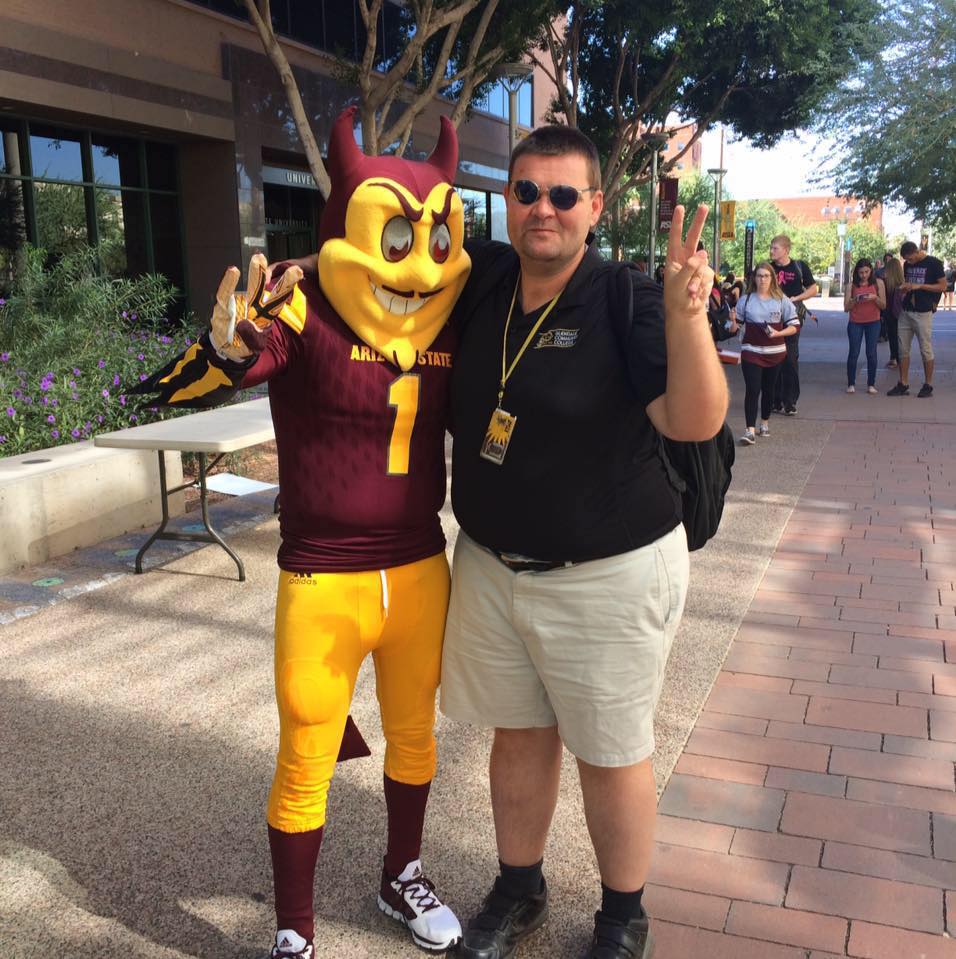ASU grad with autism overcame COVID-19 to earn degree
Fall 2020 ASU grad James Deibler faced adversity and challenging situations in their time at ASU, especially in the last year. (Deibler uses “their” pronouns). Deibler was diagnosed with autism as a child and four months ago, Deibler caught COVID-19.
Along with quarantining for 24 days, Deibler experienced an onset of painful symptoms. Thankfully, recovery was on the horizon, and Deibler persevered during a challenging final two semesters and graduated with a degree in public policy in December. Originally from Queens, New York, Deibler said that they are proud of what they accomplished during their five years at ASU.

ASU grad James Deibler takes a photo with Sparky at the ASU Downtown Campus.
Deibler was nonverbal for the first 10 years of their life and spoke for the first time in fourth grade at Holiday Park Elementary School, with help from a speech therapist. They have now been talking for 25 years.
“Autism is hard to overcome with the disabilities disorder. You need to work hard to achieve in order to be a successful person,” they said.
Deibler worked with ASU’s Student Accessibility and Inclusive Learning Services for invaluable accomodations to help achieve the goal of graduation.
“ASU Student Accessibility helped me with my education by allowing me to obtain a bachelor’s degree and teaching me different techniques for how to succeed in college.”
During their time at ASU, Deibler was involved with Undergraduate Student Government on the ASU Downtown Phoenix campus and is currently a commissioner for Phoenix Mayor Kate Gallego on disabilities issues.
“I resolve sidewalk and building ADA [Americans with Disabilities Act] complaints and make sure people with disabilities can roam freely without any trouble. I also attend city council meetings to voice my concerns to the community,” Deibler said.
Deibler plans to use their degree to get a job with St. Vincent De Paul with the fellowship program, and long term, they want to work in public policy to help people with disabilities.
“I would like to help create new policies for individuals with disabilities to make it easier for them to get into college after graduating from high school.”
Deibler spoke with ASU Student Life about their time at ASU, what they learned, what advice they’d give to current students and what the future looks like for them.
Question: What’s something you learned while at ASU — in the classroom or otherwise — that surprised you, that changed your perspective?
Answer: I learned about working with different groups of people during my in-person and online classes. I volunteered with ASU Changemaker to help with St. Vincent De Paul making thank-you cards for first responders.
Q: Why did you choose ASU?
A: The reason I chose Arizona State University is because it helps me gain more experience in terms of my classroom skills.
Q: Which professor taught you the most important lesson while at ASU?
A: My professor taught me about the importance of public service and public policy, as well as the U.S Constitution and the Bill of Rights, in my POS 310-American National Government class at Arizona State University.
Q: What’s the best piece of advice you’d give to those still in school?
A: Work hard every day and don’t give up on your college dreams.
Q: What was your favorite spot on campus, whether for studying, meeting friends or just thinking about life?
A: I enjoyed the football games and found them exciting to watch [at the stadium]. The ASU football program gets the best players around the country.
Q: What are your plans after graduation?
A: I want to use my bachelor’s degree to obtain a job with the St. Vincent De Paul Society for the fellowship program. After the fellowship program is over, I plan to use this degree for work in public policy for persons with disabilities.
Q: If someone gave you $40 million to solve one problem on our planet, what would you tackle?
A: I would use $40 million to solve global warming to make sure that gas-powered cars will be converted to electric-powered cars. This would cut air pollution by 60% and ultimately help reduce death.